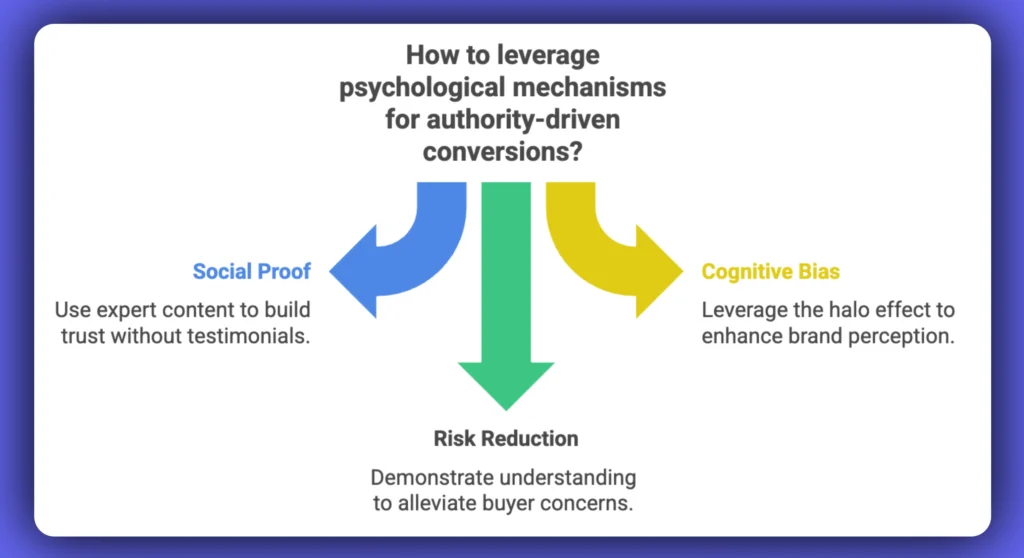Here’s what most startups miss: topical authority doesn’t just boost your search rankings, it can increase conversion rates by 35-50% compared to generic content marketing approaches. When you establish deep expertise in your domain, visitors don’t just find you; they trust you enough to buy from you. The connection between authority and conversions isn’t coincidental, it’s psychological, measurable, and the secret weapon of high-growth startups.
The startups dominating their markets in 2025 understand that topical authority is conversion optimization in disguise. Instead of spending thousands on A/B testing button colors, they’re building systematic expertise that turns skeptical visitors into confident buyers.
The Trust-Conversion Connection: Why Authority Converts
Topical authority doesn’t just bring in more visitors; it also helps turn them into customers. Users who trust your content are more likely to engage with your products or services, leading to higher conversion rates and revenue growth.
Think about your own buying behavior. When researching a complex purchase, you naturally gravitate toward sources that demonstrate deep expertise. You’re more likely to buy project management software from a company that’s published comprehensive guides on team productivity than one with generic “5 Tips” blog posts.
This psychological principle scales across industries and customer segments. B2B buyers, especially, conduct extensive research before making purchasing decisions. They need to feel confident that vendors understand their challenges and can deliver solutions.
Topical Authority Advantage in Numbers:
- Companies with strong topical authority see 40-60% higher organic conversion rates
- Expert content generates 3x more qualified leads than generic content
- Authoritative brands command 15-25% price premiums over competitors
How Topical Authority Impacts Every Stage of Your Funnel
Top of Funnel: Higher-Intent Traffic
When you build topical authority, you attract visitors who are actively seeking expertise, not just casual browsers. These users arrive with specific problems and higher purchase intent.
- Traditional SEO attracts: “What is project management?”
- Authority-based SEO attracts: “Best project management frameworks for distributed engineering teams”
The second query indicates someone much closer to making a purchasing decision.
Middle of Funnel: Accelerated Trust Building
Authoritative content shortens the typical buyer journey by front-loading credibility. Instead of requiring multiple touchpoints to build trust, prospects arrive already convinced of your expertise.
One SaaS startup shared on r/startups how their detailed technical guides resulted in enterprise prospects requesting demos on first contact, something that previously took 3-4 marketing touches to achieve.
Bottom of Funnel: Reduced Sales Friction
When prospects view you as the expert, they spend less time comparing alternatives and more time evaluating fit. Your sales team closes deals faster because buyers aren’t questioning your competence, they’re validating your solution matches their needs.
The Psychological Mechanisms Behind Authority-Driven Conversions
Social Proof Through Expertise
Comprehensive, expert-level content serves as social proof without requiring testimonials or case studies. When visitors encounter detailed, nuanced content that addresses their specific challenges, they infer that you’ve helped similar customers successfully.
Cognitive Bias Leverage
Authoritative brands benefit from the “halo effect”, when expertise in one area creates positive assumptions about overall competence. A cybersecurity company that publishes authoritative threat analysis is assumed to build better security products.
Risk Reduction
B2B purchases involve significant risk, career risk for the buyer, financial risk for the company. Topical authority reduces perceived risk by demonstrating that you understand the complexity of the customer’s environment and the potential pitfalls of implementation.

Building Topical Authority That Converts: The Strategic Framework
Phase 1: Domain Mapping and Content Architecture
Most companies approach topical authority randomly, creating content about whatever seems relevant. High-converting authority requires systematic domain mapping.
Map Your Authority Domains:
- Core expertise (your product category)
- Adjacent expertise (related problems you solve)
- Industry-specific applications (vertical use cases)
- Implementation challenges (practical execution issues)
Content Architecture That Converts:
- Foundation Content: Comprehensive guides that establish basic credibility
- Advanced Content: Technical deep-dives that demonstrate expert-level understanding
- Application Content: Real-world scenarios and implementation frameworks
- Comparison Content: Objective analysis of different approaches and solutions
Phase 2: The Authority Funnel Strategy
Traditional content marketing creates awareness. Authority-based content marketing creates preference and purchase intent simultaneously.
Top-Funnel Authority Content:
- Industry trend analysis with original insights
- Comprehensive problem frameworks that educate the market
- Research-backed position papers on industry challenges
Mid-Funnel Authority Content:
- Detailed implementation guides and best practices
- Comparative analysis of different solution approaches
- Case studies that demonstrate deep understanding of customer challenges
Bottom-Funnel Authority Content:
- Technical specifications and integration guides
- ROI calculation frameworks specific to your solution
- Implementation timelines and resource requirements
Phase 3: Measurement and Optimization
A good conversion rate is above 10%, with some businesses achieving an average of 11.45%. Track how topical authority impacts your specific conversion metrics:
Authority-Specific Conversion Metrics:
- Time from first visit to qualified lead
- Content engagement depth (time on page, pages per session)
- Lead quality scores from sales team
- Sales cycle length for authority-driven leads
Leading Indicators of Authority Impact:
- Expert content sharing and citing by industry peers
- Speaking opportunities and thought leadership invitations
- Inbound partnership and collaboration requests
- Media mentions as industry expert
Common Mistakes That Kill Authority-Driven Conversions
Mistake 1: Surface-Level Content That Claims Expertise
Many companies publish content that sounds authoritative but lacks substance. This backfires by creating expectations you can’t meet, actually reducing conversion rates.
The Fix: Only create content where you have genuine expertise. It’s better to be the definitive expert in a narrow domain than mediocre across broad topics.
Mistake 2: Authority Without Clear Commercial Connection
Some companies build impressive thought leadership but fail to connect their expertise to their commercial offering. Prospects respect their knowledge but buy from competitors.
The Fix: Every piece of authority content should include natural connections to your solution, even if subtle. Expert content should demonstrate the thinking that led to your product decisions.
Mistake 3: Inconsistent Expertise Across Touchpoints
Building authority through content while maintaining generic messaging elsewhere creates cognitive dissonance that kills conversions.
The Fix: Ensure your sales materials, product documentation, and customer communications reflect the same level of expertise demonstrated in your content.
Industry-Specific Topical Authority Strategies
B2B SaaS: Technical Authority That Converts
B2B SaaS companies with high conversion rates typically demonstrate authority through:
- Detailed integration guides and technical documentation
- Performance benchmarking and optimization frameworks
- Security and compliance deep-dives
- Scalability planning and architecture guidance
Professional Services: Methodology Authority
Service companies convert better when they establish authority through:
- Proprietary frameworks and methodologies
- Industry-specific process documentation
- Results prediction and measurement systems
- Change management and implementation strategies
E-commerce: Category Authority
E-commerce brands increase conversions by becoming the definitive source for:
- Product education and buyer guides
- Use case analysis and application scenarios
- Quality standards and evaluation criteria
- Industry trends and innovation insights
Scaling Authority-Driven Conversions
The Compound Effect of Authority Content
Unlike paid advertising, which stops working when you stop paying, topical authority builds compound returns. Each piece of expert content reinforces overall credibility and continues attracting and converting prospects indefinitely.
Cross-Channel Authority Amplification
Authority built through content marketing amplifies performance across all channels:
- Paid ads convert better when landing on authoritative content
- Sales conversations start from a position of credibility
- PR opportunities increase as media recognizes expertise
- Partnership discussions begin with established credibility
Authority-Driven Product Development
Companies with strong topical authority receive constant feedback from their expert content, enabling product development that better serves market needs and converts more effectively.
The Future: Authority in AI-Powered Conversions
As AI search becomes prevalent, topical authority becomes even more critical for conversions. Since the release of its Hummingbird algorithm update in 2013, Google has been a semantic search engine. That means it tries to understand the user intent behind search queries rather than just responding with keyword matches.
AI systems preferentially surface and recommend authoritative sources, meaning authority-driven companies will capture disproportionate AI-influenced traffic, and those visitors will arrive with even higher conversion intent than traditional search traffic.
The startups building systematic topical authority now will dominate both traditional and AI-powered conversion channels in the coming years.
Measuring ROI: Authority Content vs. Traditional Marketing
Traditional Content Marketing ROI:
- Immediate traffic and engagement metrics
- Short-term lead generation
- Campaign-specific conversion tracking
Authority Content ROI:
- Sustained organic traffic growth
- Higher lifetime customer value from authority-driven leads
- Reduced overall customer acquisition costs
- Premium pricing power and reduced sales cycle length
The difference is profound. Authority content may cost more to produce initially, but delivers compounding returns that traditional content cannot match.
Ready to build topical authority that converts? SevenSEO helps growth-stage startups develop systematic authority strategies that drive both search visibility and conversion performance. Our team combines deep content expertise with conversion optimization to create authority that directly impacts revenue growth. Book a free consultation to audit your current authority positioning, or download our guide to building conversion-focused topical authority.
